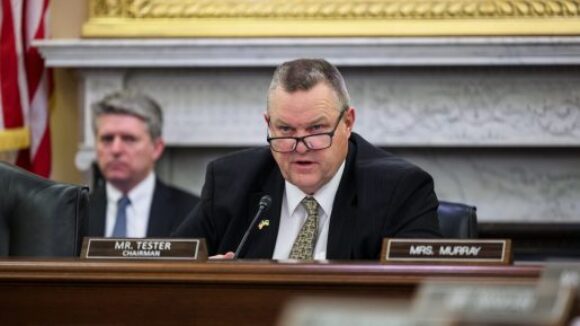‘People Have a Right to Make Their Own Choice’
Avelo employee Kim Howard believes all the firm’s flight attendants should get to vote on continued AFA rule. Credit: WTNH-TV (ABC,…
 Excerpt from NRTW President Mark Mix Op-Ed in the Washington Times (to read the full version, click here):
Excerpt from NRTW President Mark Mix Op-Ed in the Washington Times (to read the full version, click here):
Today, Big Government, not the private sector, is Big Labor’s bread and butter. That’s why union officials push relentlessly for higher taxes and bigger government and seem completely unconcerned that the policies they advocate will slash overall private-sector job growth in future years.
Just three decades ago, less than a third of all employees subject to “exclusive” union bargaining worked for the government. Earlier this year, the U.S. Labor Department reported that for the first time ever, a majority of unionized workers across America are now government employees.
The outsized power and privileges of government union bosses clearly are a major force behind the unsustainable growth of government payrolls. According to data furnished by respected labor economists Barry T. Hirsch and David A. Macpherson, nonunion government employment nationwide actually fell by 2 percent, but Big Labor-controlled government employment grew by nearly 4 percent from 2007 to 2009.
Incredibly, nearly all Democrats and many Republicans on Capitol Hill appear eager to make matters even worse by rubber-stamping legislation (H.R. 413 and S. 3194) that would federally grant public-safety union officials monopoly bargaining privileges over state and local public employees nationwide.
In states that don’t already authorize public-safety monopoly bargaining, this legislation would impose it federally, denying localities the option to refuse to grant a union hierarchy the power to speak for all front-line employees, including those who don’t want to join. In most states that already authorize public safety union monopolies, H.R. 413 and S. 3194 would widen their scope.
This legislation also would, as former Service Employees International Union second-in-command Anna Burger has boasted, “create a national collective [i.e. monopoly] bargaining standard for all public workers.”
Federalizing “exclusive” union bargaining over public safety employees would be ill advised under any circumstances, but at a time when taxes already are poised to skyrocket and cities and towns across America already are trying to deal with the worst fiscal crisis in decades, Congress would have to be incredibly reckless to enact this bill. By tipping the scales even further in favor of government-employment growth over business job growth, this legislation could kill hopes of reviving America’s private-sector economy for a long, long time.
Nevertheless, the current congressional majorities and the president are so beholden to Big Labor that they are very likely to make police and fire monopoly-bargaining legislation the law of the land soon, unless freedom-loving citizens nationwide contact their congressmen and senators, urging them to oppose H.R. 413 and S. 3194 in massive numbers.

Avelo employee Kim Howard believes all the firm’s flight attendants should get to vote on continued AFA rule. Credit: WTNH-TV (ABC,…

California’s Big Labor-concocted A.B.5, signed into law by Gov. Gavin Newsom in 2019, made it almost impossible for workers and firms to bounce back after 2020’s COVID-19 lockdowns. Now Biden bureaucrats want to federalize A.B.5!

Thanks to the Committee's election-year program, union-label candidates like Sen. Jon Tester (Mont.) are being given a choice: pledge to change course and support Right to Work going forward, or face the potential political consequences.